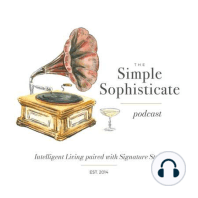40 min listen

327: How to Change Your Brain So Your Mind (and thus you!) Can Thrive
FromThe Simple Sophisticate - Intelligent Living Paired with Signature Style
327: How to Change Your Brain So Your Mind (and thus you!) Can Thrive
FromThe Simple Sophisticate - Intelligent Living Paired with Signature Style
ratings:
Length:
57 minutes
Released:
Apr 18, 2022
Format:
Podcast episode
Description
"Although your true nature may be hidden momentarily by stress and worry, anger and unfulfilled longings, it still continues to exist. Knowing this can be a great comfort."—Rick Hanson, PhD with Richard Mendius, MD, Buddha's Brain: The practical neuroscience of happiness, love and wisdom The mind's default is dialed to 'survive', not to thrive. However, the wonderful 'gift' that our brain has within it is the toolbox full of tools (i.e. capabilities) to learn the skills to change the dial to 'thrive'. There is a distinction, however slight between the brain and the mind, and while the two are often conflated, think of the brain as the physical entity within your skull and the mind, the conceptual idea maker that thinks due to the capabilities of the brain. With that said, the title refers to the truth of what will change your life for the better. The author of Buddha's Brain, Rick Hanson is a neuropsychologist shares along with the contributor, doctor in neurology Richard Mendius, "If I know one thing for sure, it's that you can do small things inside your mind that will lead to big changes in your brain and your experience of living . . . you really can nudge your whole being in a better direction every day. When you change your brain, you change your life." The secret that is often unknown unless we are taught, learn or observe it, is that we have to change the dial from 'survive' to 'thrive' and it is a muscle we have to keep toned. The question I have been asking for over two decades is How. And while I have been grateful to find books over the past twelve years, sharing so many of them and what I have here on TSLL, it was reading Buddha's Brain that provided the science that help me make sense of why my brain encourages my mind to default in certain ways that in hindsight are not helpful. (I will list the other previous books and their post/episodes below.) 1.Practice the three fundamentals of Buddha's teachings: Virtue, Mindfulness and Wisdom Since our brain and how it functions is the reason we suffer, yet we can change the brain, then we can also cure the suffering. Hanson summarizes what Siddartha who over two thousand years ago, at the time not yet called Buddha, discovered as he trained his mind "thus his brain" while understanding the causes of suffering, also discovered the "path to freedom from suffering". Let's take a look at what each of these three look like in everyday life: Virtue: "regulating your actions, words and thoughts to create benefits rather than harm yourself or others" Mindfulness: "the skillful use of attention to both your inner and outer worlds" Wisdom: "applied common sense . . . first, come to understand what hurts and what helps . . . then based on this understanding, let go of those things that hurt and strengthen those that help . . . as a result, over time you'll feel more connected with everything, more serene about how all things change and end, and more able to meet pleasure and pain without grasping after the one and struggling with the other" 2. Prolong feelings of happiness Did you know that as "you become a happier person, the left front region of your brain becomes more active"? Yep. And this is a very good thing because the left frontal region of your brain is where your skills for communication and thinking abstractly as well as understanding abstraction are rooted. When we consciously prolong and hold ourselves in moments of happiness, in other words, savor them deeply, we are actually rewiring our brain, and "when neurons fire together, they wire together". When we do this regularly, savoring what is good, what makes us happy, we are gradually, yet steadily and significantly changing our brains, and thus 'how we think' for the better. 3. You don't need more resources, you already have what you need The key to changing our brains is not to have more money, more time or well, anything outside of ourselves, which is very good news. The key is awar
Released:
Apr 18, 2022
Format:
Podcast episode
Titles in the series (100)
25: Why Not . . . Become Self-Actualized?: What is Self-Actualization? What Are the Benefits? And How do I Achieve It? by The Simple Sophisticate - Intelligent Living Paired with Signature Style